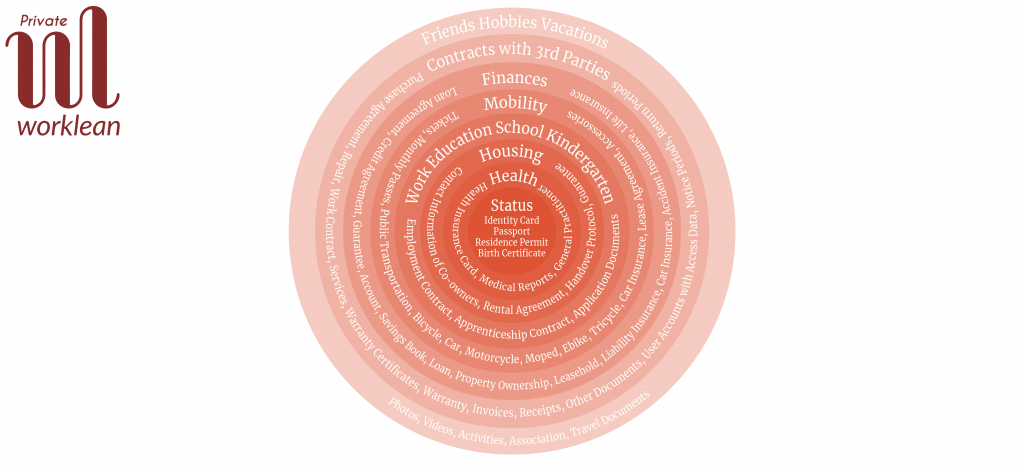
What did we learn in Part 1?
Filing is Not Taught
In the first part, we learned that very few of us are good at filing. This is because it is not taught anywhere, and one has to discover this skill independently. However, most people do not find this topic particularly interesting.
Yet, filing is as important as digesting a good meal.
Intuitive Filing by Life Areas
As a concept for an intuitive filing system that yields good results, we suggested organizing files by life areas. Our list of life areas is as follows:
- Status
- Health
- Housing
- Work, Education, School, Kindergarten
- Mobility
- Finances
- Contracts with Third Parties
- Friends, Hobbies, Vacation
- Ongoing Matters
Filing Rules
Worklean offers a guided project (template) for private matters. It serves as a filing system for personal affairs. The template consists of nine folders, named as listed above (1. Status, 2. Health, 3. Living, etc.).
Each folder includes annotations with numerous terms identifying documents that can be assigned to the respective folder. This supports the user in the filing process.
Here are some rules to follow when using this filing system:
- Use as few folders as possible.
- Add extra folders only when necessary to keep the documentation well-arranged.
- Use a fixed order of folders and try not to change it (001, 002, 003). This also applies to subfolders within a folder.
- Use a fixed order for the documents and try not to change it (001, 002, 003).
- Group related documents by using appropriate numbering (001, 001a, 001b or 100, 101, 102, 200, 201, 202).
- Give each document a title that could serve as a headline and include the document’s date (e.g., Letter to Müller from 06/20/2024).
- Record metadata or the context of documents or folders in the annotations (e.g., sender of the letter, recipient, reason for writing, deadlines, expiration dates, when a document should be deleted, etc.).
- Generally, a chronological filing system is advisable (due to the increasing numbering of documents older documents are at the top and newer ones at the bottom, unless reversed alphabetical order is used).
- Remove outdated documentation and store it separately if necessary (either in the same folder with the term „Outdated“ or in a separate subfolder for archived information).
- Sort documentation from ongoing projects into your files only once the project is completed and closed.
- Maintain ongoing documentation at least once a week at a set time.
- For family members, create a separate subfolder for each family member within each life area (as soon as there is documentation).
- Avoid duplicating documents. Refer to the existence of other documents in the annotation instead.
- File every document electronically, including physical documents, even if the physical copy is the original document relevant in the public dealings.
- The filing system for physical documents should follow the filing system established for the electronic documents.
Leaflet for the Rules
The filing rules are included in the guided project Private Affairs in a leaflet (additional document alongside the folders). This way, you always have the rules at hand when dealing with your filing.
If you wish, print the leaflet, laminate it, and keep it on your desk. This way, you always have the rules in front of you when managing your filing.
Over time, certain habits will develop, and filing will become easier, even without referring to the guide.

